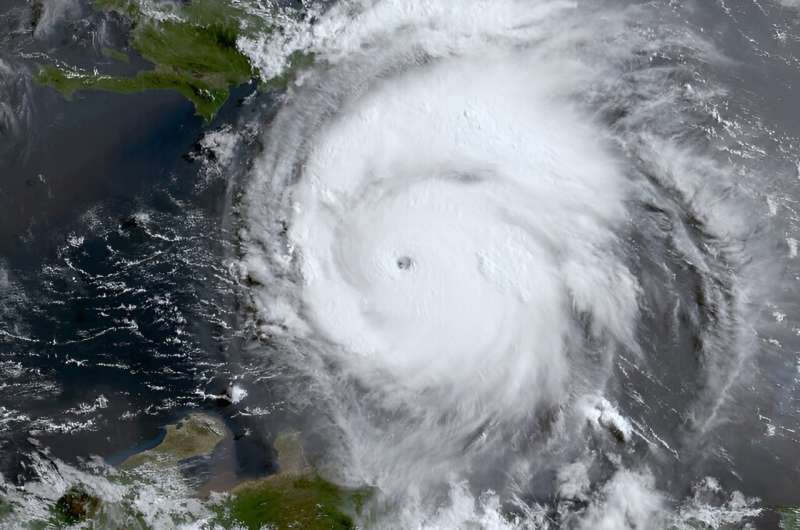This article has been reviewed according to Science X's editorial process and policies. Editors have highlighted the following attributes while ensuring the content's credibility:
fact-checked
proofread
Beryl sets off alarm bells among hurricane experts

This year, hurricane season has taken off with a ferocious, ominous start thanks to Beryl—the earliest Category 5 hurricane ever recorded, with winds topping out at 165 mph. Beryl bulldozed the Caribbean, made its way through Mexico and then plowed into Texas. As of the time of publication, over 2.1 million Texans are without power, just as a severe heat wave descends on the region.
The increasing severity of hurricanes acutely stresses power grids like those in Texas, which could adversely affect everything from homes to health care facilities. It could cost a city "billions of dollars to recover from these deadly storms that sent hurricane-force winds through the city's downtown," Radley Horton, professor at the Columbia Climate School and climate scientist at Lamont-Doherty Earth Observatory, recently said on the Columbia Energy Exchange podcast.
"These extreme events [are] happening more quickly than we thought…. We don't have the resources to invest at the level we need to in adaptation, and we have a tendency not to protect our most vulnerable populations, even before you bring in the variable of climate change."
Meanwhile, the short time it took Beryl to intensify—from a tropical depression (or cyclone) into a Category 4 hurricane in just 48 hours—has also caused alarm. Its rapid increase in intensity is most likely linked to climate change. (Back in 2017, media outlets even opined on expanding storm-strength rankings after Hurricane Irma remained at 185 mph for two days.) And the National Oceanic and Atmospheric Administration predicts this Atlantic hurricane season will be 85% more active than normal.
As hurricane frequency and intensity grow, so will death tolls and costly destruction. "Urban development has added impervious surfaces, intensifying runoff with any excessive rainfall," Mona Hemmati, a research scientist at Lamont-Doherty Earth Observatory, which is part of the Columbia Climate School, posted on X, as Beryl descended on Texas. "As the climate warms, more intense rainfall is expected, worsening existing flooding issues. There is a real need for infrastructure and urban planning initiatives to address this ongoing issue!"
Of course, "normal" is a nebulous term in these days of accelerated climate change. Amid Beryl's sweeping devastation—which Grenada's prime minister referred to as "unimaginable"—this storm has rattled scientists studying how quickly climate change may be reshaping our expectations of hurricane season.
Hurricanes form when warm waters evaporate from an ocean surface and rise into the cooler air above it. This creates storm clouds and releases heat, as the earth's rotation causes this atmospheric occurrence to spin with increasing momentum as it grows larger.
This year, the transition from El Niño conditions, a climate phenomenon that raises ocean-surface temperatures, to the more-than-likely presence of La Niña, its cooler counterpart, will also play a part in the Atlantic's hurricane activity this year. Each impacts hurricanes in different ways: Where El Niño tends to stoke hurricanes in the central and eastern Pacific basins, La Niña increases them in the Atlantic.
The first red flag is how early Beryl developed. According to the National Hurricane Center, the first "major" hurricane typically forms in late August or early September. This year, warmer-than-usual oceans have exacerbated hurricane season.
"When we look at this year, we haven't just had exceptional atmospheric temperatures, the oceans across much of the world…have been exceptionally warm," says Horton. "That gives more fuel for tropical storms, for hurricanes, because you really need a warm ocean in order for those storms to be able to form."
This activity disrupts our ecosystems, too. Just four years ago, after Hurricane Maria ravaged Puerto Rico, Maria Uriarte, a forest ecologist at Columbia, sounded the alarm that biodiversity will also suffer from climate-driven storms.
"These hurricanes are going to kill more trees. They're going to break more trees. The factors that protected many trees in the past will no longer apply," she told State of the Planet. "Forests will become shorter and smaller, because they won't have time to regrow, and they will be less diverse." Images from Grenada alone seem to indicate that Beryl has caused massive environmental damage, alongside wiping out countless buildings and homes.
Beryl has managed to shift the way scientists look at hurricanes. While we can't blame climate change for causing hurricanes, we can link it with their severity.
"Some feedbacks could be kicking in that lead to more warming at a faster rate than climate models suggest," Horton says. "So it's not that the greenhouse gas concentrations are higher than we thought; it's what if we're going to get more warming for a given amount of greenhouse gas concentrations than we thought we would."
Because, simply put, warm waters power hurricanes. "The really big takeaway for me," Horton says of the increasing occurrence of climate events, "is that I believe we have underestimated the societal impacts, the damage caused by one-and-a-half degrees [of climate warming]. That is the biggest issue."
Provided by State of the Planet
This story is republished courtesy of Earth Institute, Columbia University http://blogs.ei.columbia.edu.



















